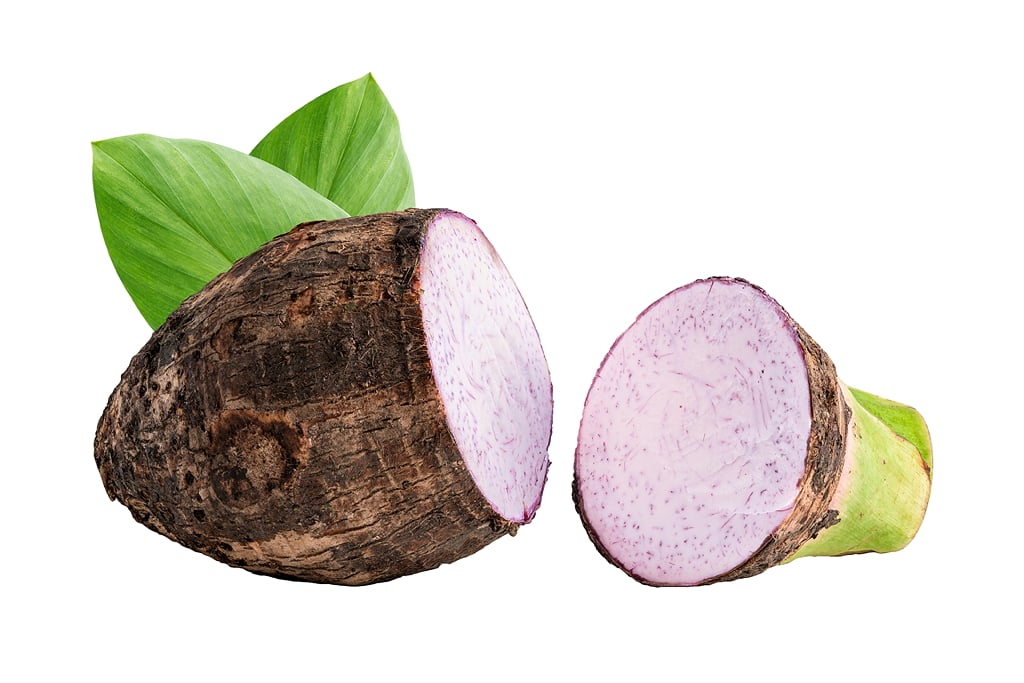
Island Authentics
Introducing kalo and uala
Island Authentics
Introducing kalo and uala
By Rebecca Peizer
February 6, 2024
By Rebecca Peizer
February 6, 2024
Kalo, the traditional taro root used to make poi, doesn’t always get the acclaim it should due to two variable factors: its most traditional preparation involves fermenting a hydrated mash that has been pounded by hand, and its flavor is an acquired taste. I have experimented with using kalo as a batter, resulting in exquisitely light and crisp gluten-free waffles. It also makes a great base for sweet brunch items, as well as savory hors d’oeuvres and high-end foie gras dishes. I have also inoculated it to make a dairy-free yogurt alternative.
Similarly, foods such as the purple uala sweet potato have been making waves in the form of colorful and nutritious chips and mashes. I have used uala for samosa or pierogi fillings and even as a savory filling for the traditional Hawaiian malasada, which is usually flavored with pineapple or lilikoi.
Kalo, the traditional taro root used to make poi, doesn’t always get the acclaim it should due to two variable factors: its most traditional preparation involves fermenting a hydrated mash that has been pounded by hand, and its flavor is an acquired taste. I have experimented with using kalo as a batter, resulting in exquisitely light and crisp gluten-free waffles. It also makes a great base for sweet brunch items, as well as savory hors d’oeuvres and high-end foie gras dishes. I have also inoculated it to make a dairy-free yogurt alternative.
Similarly, foods such as the purple uala sweet potato have been making waves in the form of colorful and nutritious chips and mashes. I have used uala for samosa or pierogi fillings and even as a savory filling for the traditional Hawaiian malasada, which is usually flavored with pineapple or lilikoi.
About the Author
![]() Chef Rebecca Peizer is the owner of the culinary consultancy All Things Culinary LLC, as well as a professor, consulting partner, digital media talent and conference stage manager for the Culinary Institute of America at Copia in Napa Valley, Calif. She has worked for many esteemed wineries, restaurants, resorts and culinary schools in New York, Napa Valley and Las Vegas. She implemented the nation’s first farm-to-table culinary program at the Culinary School of the Rockies in Boulder, Colo., and does pro bono work for the Salvation Army and Gray Haven Health & Wellness. Rebecca is an active forager and herbalist and has earned certifications in cheesemaking, permaculture design, professional wine studies, CEC and CHE.
Chef Rebecca Peizer is the owner of the culinary consultancy All Things Culinary LLC, as well as a professor, consulting partner, digital media talent and conference stage manager for the Culinary Institute of America at Copia in Napa Valley, Calif. She has worked for many esteemed wineries, restaurants, resorts and culinary schools in New York, Napa Valley and Las Vegas. She implemented the nation’s first farm-to-table culinary program at the Culinary School of the Rockies in Boulder, Colo., and does pro bono work for the Salvation Army and Gray Haven Health & Wellness. Rebecca is an active forager and herbalist and has earned certifications in cheesemaking, permaculture design, professional wine studies, CEC and CHE.







